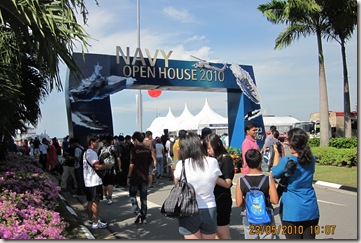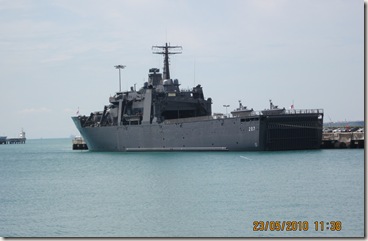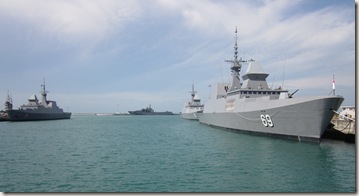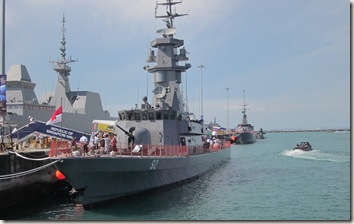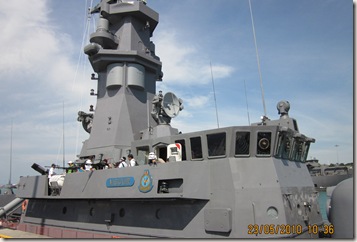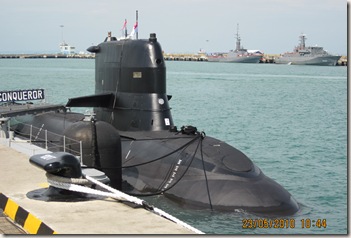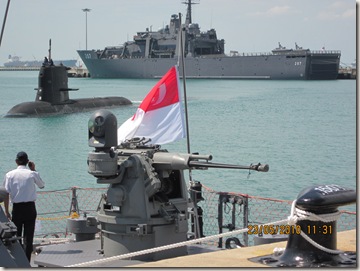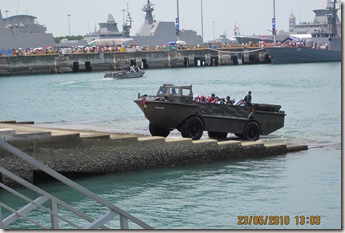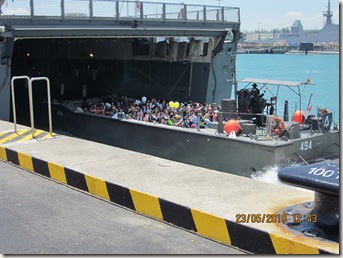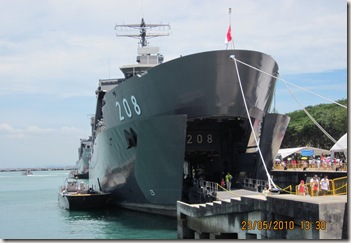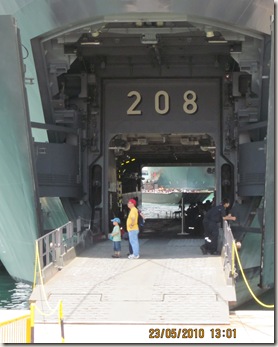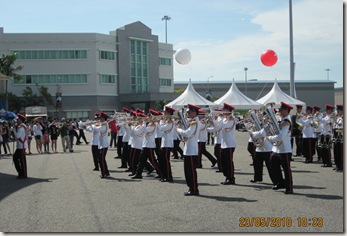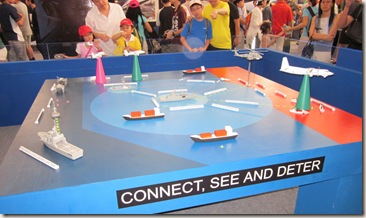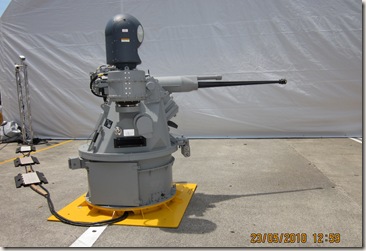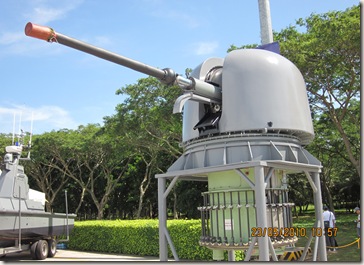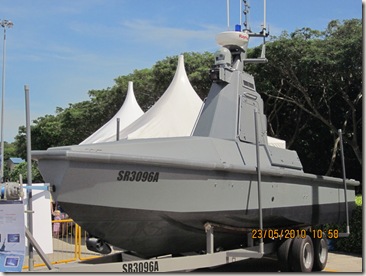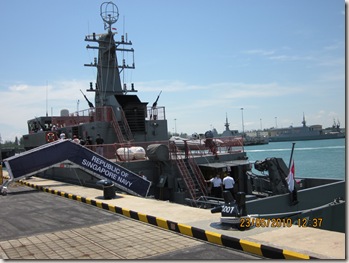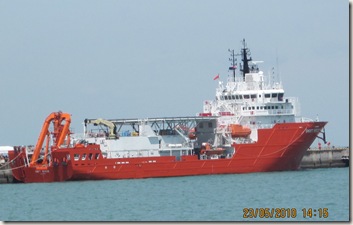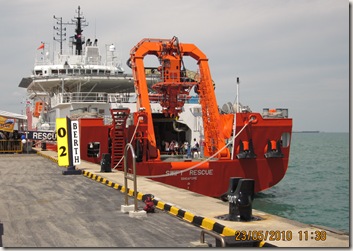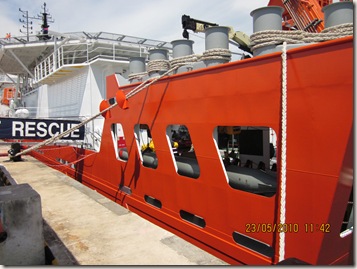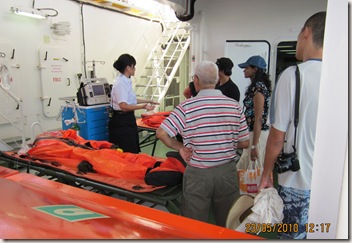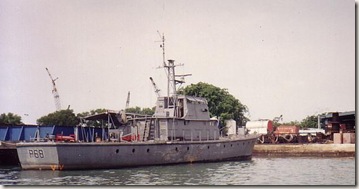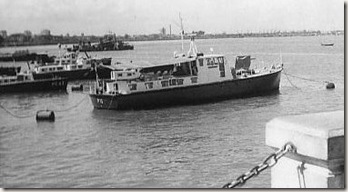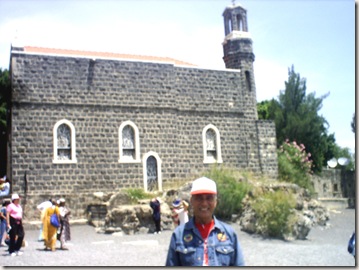As an early bird I took the MRT from Jurong East Inter-change to Singapore Expo where I boarded a Chartered bus that ferried the lot to Changi Naval base. We alighted before the entrance, prop-up by a decorated archway; welcoming us. We walked through and had a full view of the sprawling area which is about the size of 15 football fields.
Entrance to ‘Navy Open House, 2010’
Stealth frigate ‘RSS Steadfast’ pennant No.70
The Stealth frigate is French design of the ‘La Fayette’ class by ‘Direction des Constructions Navales’ (DCN). The first ship to be built for the RSN was RSS ‘Formidable’ and launched in Lorient in 2004. The subsequent 5 ships were built by Singapore Technologies Marine at their Benoi Shipyard. They are the following RSS ‘Intrepid (69), ‘Steadfast (70), ‘Tenacious’ (71), ‘Stalwart’ (72) and ‘Supreme’ (73). They are known as the ‘Formidable’ Class.
The 114.8m long stealth frigate ‘Steadfast’ commissioned in 2008 is armed with a single 76mm Oto Melera forward; also with harpoon, Aster SAM’ missile and torpedoes. The heli-deck at the stern can accommodate one S-70B ‘Sea Hawk’ Naval attack helicopter.The ship has a speed about 27 knots and compliment of 70 crew.
Sad to say that the event coincide with the death of the former Deputy Prime Minister, Dr Goh Keng Swee, who was also the Defence Minister. In the show of respect to this great man all the Naval White Ensigns were flown half-mast.
Landing Ship Tank RSS 'Endurance’(207)
'Endurance' class amphibious transport/dock are the biggest type of ships in the RSN. Locally designed and built by Singapore Technology Marine at their Benoi Shipyard. The 6,000 tons displacement ship has a front-loading bow, a well at the stern for landing craft to dock and a heli-deck for 2 Super Pumas helicopters. Seen here on the heli-deck are so called two small 9m long un-manned, armed modular platforms; the ‘Protector’ USV. (Un-manned Surface Vessel). It is used primarily for surveillance and protection duties. It saves from putting a man, a human- being at risk at being shot at. To-day amazingly technology has so advanced and achieve such high standards of reliability in creating substitutes to replace humans-beings for certain jobs and performing it well.
Another view of Changi Naval base.
The stealth frigate RSS ‘Intrepid’ pennant No.69, berth along-side for the general public go on board for viewing, to have some idea how their loved ones, husbands or brothers or sons or relatives live onboard a modern warship.
The guided-missile Corvette, ‘RSS Vigour’
The RSS ‘Vigour’ is 62m long corvette built locally by S.T. Marine and commissioned in 1991. It has anti-submarine capability, also being armed with one 76mm Oto Melara quick-firing gun; harpoon anti-ship missiles and Barak surface-to-air (SAM) missiles. Their speed 30 knots and.the six ships of the ‘Victory’ class form No.188 Squadron RSN.
The bridge and mast of the corvette RSS ‘Vigour’
The single 76mm Oto Melara forward gun.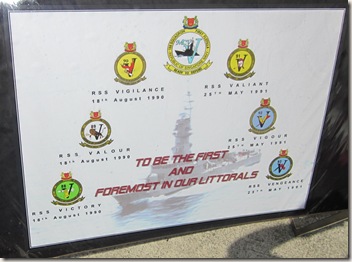
The squadron insignia badges of the 6-ships formation
The submarine RSS ‘Conqueror’
Purchased from Sweden in the 90’s belongs to the ‘Sjoormen’ (re-named ‘Challenger’ class) of 1200 tonnes (submerged). Length:51m with speed 10knots/surface and 16knots/submerged. Crew:28. Five were obtained four commissioned with one as spare. The four submarines form No.171 Squadron. Latest addition are two larger types, the ‘Archer’ class (Vestergotland) is 60.5m in length, has double decks and equipped with air independent propulsion (AIP) system. The mixture of pure oxygen with diesel, compressed in the combustion chamber to charge the batteries. It can prolong the stay underwater and also extend the range, an improvement from the 'Challenger' class. It is armed with 9 torpedo tubes with speed of 8 knots (surface) and 15 plus knots (submerge).
Another ‘Sjoormen’ class submarine enters the base
Another view of the ‘Sjoormen’ class submarine.
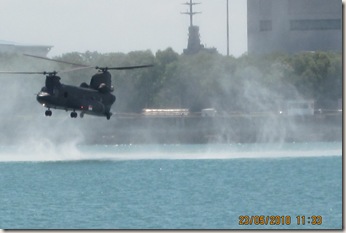
A ‘Chinook’ helicopter about to drop divers.
The Air Force twin-rotor heavy-lift CH-47 ‘Chinook’ helicopter flew in to drop naval divers in response to a mock hostage situation committed by a group of terrorists. They had held a hostage in a mock ship but soon the naval divers were in action and eventually they came to the rescue.
The LARC, 4-wheel Amphibian for joy-rides
The amphibians are ideal, vital for logistic support that can convey men, material, stores and supplies practically anywhere. They were used at Meulaboh during the Tsunami disaster and are in service with our Army and Navy. The civilians also acquire it second-hand and operate for tourism for river-rides like the ‘Duck Tours’ located at the Suntec City. However that day, the rides were free and the queues were exceptionally long; off course because they are free.
The Navy fast landing-craft
The landing-craft from the amphibious landing ships, RSS ‘Resolution’ (208) and also from RSS ‘Endeavour’ (210) both ships provided their landing-crafts for the free joy-rides operating from the stern of the ship. The ship can squat to flood the stern-section to enable the landing-crafts to float inside the well and the stern ramp-door open for access to dock or undocking. They reverse out and sail for a round trip within the basin and return for yet another trip.Very popular, crowded and always full; ‘ho sengli!’ but no money collected. Anyway many thanks! Navy guys.The landing-craft returning into the stern-well.

Heli-deck of RSS ‘Endeavour’ (210) is a ‘Super Puma’ helicopter.
The large heli-deck can also take the larger SAF twin-rotor CH-47 ‘Chinook’ heavy-lift helicopter.Bow view of the front-loading ramp RSS’ Resolution’
Bow view of the loading ramp, RSS 'Resolution'
From the bow front loading-ramp, you could see through to the stern-well, where a landing-craft approaching for docking.
The Republic of Singapore Navy Band.
For entertainment the Republic of Singapore Navy Band was in attendance to provide some popular and local favourites, .
There were some large tented structures to house a musical-stage, food-courts, family and exhibition halls that display latest high-tec gadgets or weapons systems or tactics; using even model for display.
There was also a large pool for the R/C gun-boats which the kids enjoyed sailing their miniature vessel patrolling around the setting of ‘Singapore Island’.
Remote-control, automated ‘smart’ gun with sensor.I believe if I am not wrong, those seasoned kids in the computer gaming can operate it. From the display console, take aim, the sensor will help to ‘lock-it’,then depress the red firing button and it is done!.
Outdoor display the bigger 76mm Oto Melara gun mount.
ProtectorThe 9m long the modular platform, the ‘Protector’ (USV) an un-manned surface vessel is powered by water jets with the top speed of 30 knots and duration of 8 hours. It can be armed with a single forward gun and operated by remote control from the ‘Command Vessel’ and sent out on dangerous mission; in harm’s way without risking lives. It perform the duty of surveillance,or interception of suspicious craft approaching. Equipped with an assortment of gadgets like radar, sensors, microphone,loud speaker and video camera that relay back images to the “command Ship’ for assessment and enhance decision-making for the next move.
The specifications.
Hovercraft.
Seen here and not for public display is a ‘hovercraft, an air-cushioned vehicle used as logistic support by conveying anything, men, military vehicles, equipment, stores and supplies.
The last three ships, a patrol craft, a mine-counter-measure and a special ship, a submarine Rescue ship.
The Patrol Craft.
The patrol vessel is 55m in length with a displacement of 500 tonnes and has a speed of 20 knots using 2xKamewa waterjets propulsion system. It is armed with 1x76mm 'Oto Melara' forward gun, SAM missiles and Anti-submarine torpedoes. Twelve vessels form the 182/189 Squadron. One ship RSS 'Courageous' was badly damaged in a night collision with a container ship in the Straits of Singapore that had her stern sliced off'' and with loss of life.
Mine counter-measure ship, RSS ‘Katong” pennant No.M-107
The title suggest anti-mine operations, to counter all sorts of sea mines, to acoustic mines. The modern Swedish-built ships have fibre-glass hull as non-magnetic material in it’s construction. For the older type mine-sweepers like the British ‘Ton’ class, they have wooden hulls.
The submarine rescue ship, ‘Swift Rescue’
An interesting ship with red hull and white super structure, was built in Singapore by Singapore Technology Engineering at it’s Benoi Shipyard and launched first half of 2008. The main submarine rescue vehicle was built in England by James Fisher Defence and can descend to the depth of 500m. The Navy had awarded $400 million contract to ST Marine/James Fisher for design, building and maintaining the ship/rescue system for 20 years. The vessel has the speed of 13knots and a compliment of 27.
I noted that it was flying the blue flag of the Singapore Maritime instead of the RSN white naval ensign. So obviously it is civilian registered ship with the Port of Singapore and carried a mixed crew of servicemen and civilians to operate the ship and it’s sophiscated equipment.
The stern with the prominent giant gantry to launch the rescue vehicle (submarine).
A helipad in case the need for air- evacuation of serious casualties.
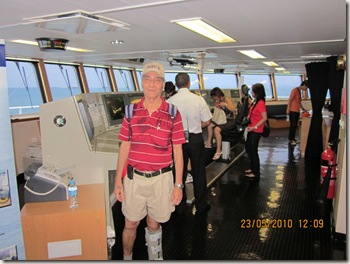
The ship’s navigation bridge, modern no steering wheel.
The absence of the familiar steering wheel, which I was accustomed seeing and now being replaced by small knobs. It appears that just not so long ago that I was last on board a ship probably in 2004, the Russian dredger ‘Khersones’ which was working in the land refill at Jurong Island and Tuas Extension. Only then I realised that technology have progressed by leaps and bounds and that I was out of touch.
A RSN woman officer explaining the casualty station
Where casualty are first attended to when they are taken out from the rescue vehicle.. From there they are transferred to the sick-bay for further treatment or monitoring and observation.
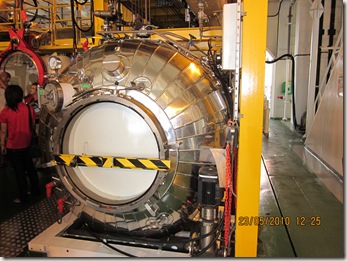
Decompression chamber.
The two large decompression chambers on board can hold 50 people for treatment. It has three compartments with central for control and are interlocked. Upon rescue and surfacing, they are being put in the chamber for decompression in order to get rid the nitrogen that are saturated in the blood stream that can form bubbles; and block arteries or cause damage or danger of heart attack.
The Rescue Vehicle (submarine)
This is the submersible, the submarine rescue vehicle DSAR-6 (Deep Search and Rescue-6) weighing 25-tonnes, Length 10m x 3.3m. It is operated by 3 crew and can rescue up to 17 people. It can descend to the depth of 500m.
Hi! Navy guys, Keep it up, I remember from the early days in 1965 after being booted out of Malaysia and independence forced upon. Our infant Navy inherited two miserable wooden ships, ‘Panglima’ a ‘Ford’ class and ex-Marine Police gun-boat with a pea-shooter named ‘Bedok’. The enormous task of building a defence force from scratch fell upon our late Dr. Goh Keng Swee; sadly he has just recently passed away. For the Army we had only two battalions of Singapore Infantry Regiment and no air force. The Army, the red head soldiers (Ang Tau Peng) as locally known; for they had white uniforms with side-caps. Like those worn by the British Royal Air Force except in red colour; so that was why they got their nickname. However, within the span of four decades, the dynamic Dr Goh laid down the foundation that transformed the Singapore Armed Forces amazingly into a fighting force to be reckon with. Our Navy a smaller transformation into a highly compact and balanced naval force with stealth frigates, missile corvettes, gunboats, anti-submarine, mine-counter-measures warfare, amphibious/logistic ships, naval helicopters, long-range Maritime patrol aircraft, submarines and now a special ship, a submarine Rescue Ship. It has come a long way to the present state of affairs; a 3G fighting force with state of art weapons, equipment, communication and networking system
The show was well organised and said to have drawn some 110,000 visitors, breaking the previous record of 100,000 in 2007. Well done! credit to you.
Re-cap two old photos: ex-RSS ‘Panglima’ at Tuas.
RSS ‘Panglima’ pennant No.P68' seen here bare, being stripped off everything. A sad ending for this historical ship, the Navy first and the longest serving ship (1956-1991) ex-RN, ex-RMN served faithfully for 35 long years and could not be saved as a memorial from the breaker’s Yard. Probably the last photo taken to capture that moment discarded and abandoned as I slowly and respectfully sailed past my 30 ft powered boat. I salute her, the grand old lady as I know that the end was inevitable and she would be broken up.
Seen at it’s Clifford Pier mooring the Marine Police gunboat, ‘Bedok’.

Sketch: RSS Panglima.
Boatman: ‘Hi! captain the Newspaper reported your ship missing.’
Captain: GGRRrr...'Don't be funny or Newspaper will report you are missing'
Anyway I wish you Navy guys, ‘Well done and keep it up’
May God bless and protect all, especially those who sail.
</ p>
